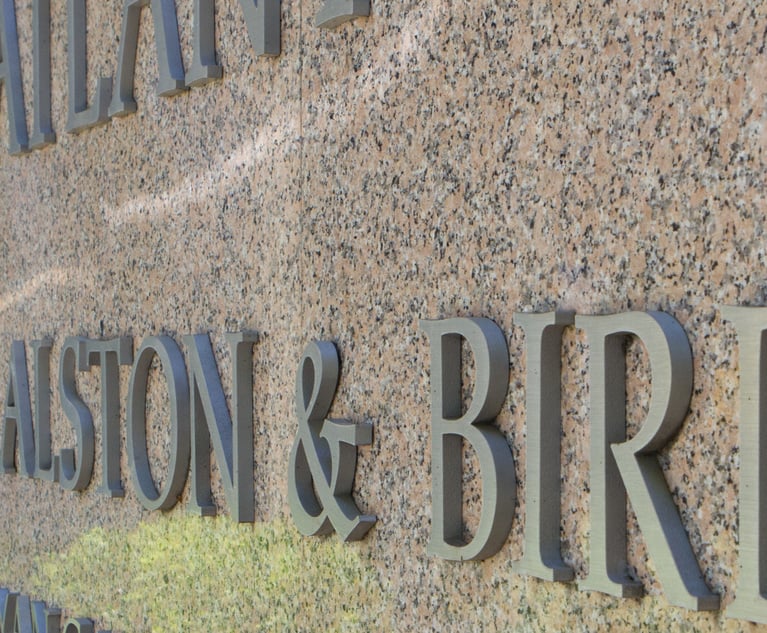 (Photo: Hyejin Kamndg/Shutterstock.com)
(Photo: Hyejin Kamndg/Shutterstock.com)Seeking Pay Equity? Management Diversity, Transparency Are Key
Employment litigator Jeanne Christensen said the makeup of a company's leadership can be a way to identify the potential for gender or racial pay inequity.
February 04, 2020 at 06:04 PM
3 minute read
The first thing employment litigator Jeanne Christensen does when considering whether to represent a potential client in a pay inequity lawsuit is look at photos of the company's management.
All too often, Christensen said, every single member of management is a white male.
"It's shocking," the Wigdor partner said Tuesday during a panel discussion on gender and racial pay equity as part of Legalweek's Legal Business Strategy program. She said diversifying leadership is the most meaningful change a company can make toward eliminating gender and racial inequity.
"That will move the needle," she said.
Companies can take other steps to increase parity, other lawyers on the panel suggested. The panel was moderated by Lisa Helem, editor-in-chief of the National Law Journal.
Tracey Salmon-Smith, a partner at Faegre Drinker Biddle & Reath in New York, said she asks clients to conduct an equal-pay audit—which can be privileged if lawyers oversee the work—and to train employees to be wary of bias.
Salmon-Smith said the audit results should be shared with management and the company's board to determine how to address pay inequity if it is found. Generally, the company needs to find a way to level the field by increasing salaries.
Salary reviews shouldn't be a "one and done" and should be looked at annually, said Jeanine Conley, a partner at Littler Mendelson in Greenville, South Carolina.
Alexandra Harwin, a partner at Sanford Heisler Sharp in New York and co-chair of the firm's Title VII practice, said it's extremely common for companies to make pay decisions privately, which can lead to inequality. Because of the secrecy, employees don't know they are being discriminated against.
Harwin's firm represents former female Jones Day associates who have sued the Am Law 50 firm in a gender discrimination lawsuit that alleges they are not allowed to discuss their compensation because of a black box compensation structure. The firm has asked that all of the plaintiffs' claims of disparate pay be dismissed.
Companies that make compensation decisions in secret cannot be held accountable when they are unfair, Harwin contends.
And all too often, Harwin said, companies make "wrong decisions" when employees bring pay concerns to management.
|Read More
Third Accuser Files EEOC Claim About Former DLA Piper Partner
This content has been archived. It is available through our partners, LexisNexis® and Bloomberg Law.
To view this content, please continue to their sites.
Not a Lexis Subscriber?
Subscribe Now
Not a Bloomberg Law Subscriber?
Subscribe Now
NOT FOR REPRINT
© 2024 ALM Global, LLC, All Rights Reserved. Request academic re-use from www.copyright.com. All other uses, submit a request to [email protected]. For more information visit Asset & Logo Licensing.
You Might Like
View All
A&O Shearman, Hogan Lovells and the Stories That Shaped Africa This Year
4 minute read
Bottoming Out or Merging Up? Law Firms That Shuttered in 2024

Law Firms Mentioned
Trending Stories
- 1'Largest Retail Data Breach in History'? Hot Topic and Affiliated Brands Sued for Alleged Failure to Prevent Data Breach Linked to Snowflake Software
- 2Former President of New York State Bar, and the New York Bar Foundation, Dies As He Entered 70th Year as Attorney
- 3Legal Advocates in Uproar Upon Release of Footage Showing CO's Beat Black Inmate Before His Death
- 4Longtime Baker & Hostetler Partner, Former White House Counsel David Rivkin Dies at 68
- 5Court System Seeks Public Comment on E-Filing for Annual Report
Who Got The Work
Michael G. Bongiorno, Andrew Scott Dulberg and Elizabeth E. Driscoll from Wilmer Cutler Pickering Hale and Dorr have stepped in to represent Symbotic Inc., an A.I.-enabled technology platform that focuses on increasing supply chain efficiency, and other defendants in a pending shareholder derivative lawsuit. The case, filed Oct. 2 in Massachusetts District Court by the Brown Law Firm on behalf of Stephen Austen, accuses certain officers and directors of misleading investors in regard to Symbotic's potential for margin growth by failing to disclose that the company was not equipped to timely deploy its systems or manage expenses through project delays. The case, assigned to U.S. District Judge Nathaniel M. Gorton, is 1:24-cv-12522, Austen v. Cohen et al.
Who Got The Work
Edmund Polubinski and Marie Killmond of Davis Polk & Wardwell have entered appearances for data platform software development company MongoDB and other defendants in a pending shareholder derivative lawsuit. The action, filed Oct. 7 in New York Southern District Court by the Brown Law Firm, accuses the company's directors and/or officers of falsely expressing confidence in the company’s restructuring of its sales incentive plan and downplaying the severity of decreases in its upfront commitments. The case is 1:24-cv-07594, Roy v. Ittycheria et al.
Who Got The Work
Amy O. Bruchs and Kurt F. Ellison of Michael Best & Friedrich have entered appearances for Epic Systems Corp. in a pending employment discrimination lawsuit. The suit was filed Sept. 7 in Wisconsin Western District Court by Levine Eisberner LLC and Siri & Glimstad on behalf of a project manager who claims that he was wrongfully terminated after applying for a religious exemption to the defendant's COVID-19 vaccine mandate. The case, assigned to U.S. Magistrate Judge Anita Marie Boor, is 3:24-cv-00630, Secker, Nathan v. Epic Systems Corporation.
Who Got The Work
David X. Sullivan, Thomas J. Finn and Gregory A. Hall from McCarter & English have entered appearances for Sunrun Installation Services in a pending civil rights lawsuit. The complaint was filed Sept. 4 in Connecticut District Court by attorney Robert M. Berke on behalf of former employee George Edward Steins, who was arrested and charged with employing an unregistered home improvement salesperson. The complaint alleges that had Sunrun informed the Connecticut Department of Consumer Protection that the plaintiff's employment had ended in 2017 and that he no longer held Sunrun's home improvement contractor license, he would not have been hit with charges, which were dismissed in May 2024. The case, assigned to U.S. District Judge Jeffrey A. Meyer, is 3:24-cv-01423, Steins v. Sunrun, Inc. et al.
Who Got The Work
Greenberg Traurig shareholder Joshua L. Raskin has entered an appearance for boohoo.com UK Ltd. in a pending patent infringement lawsuit. The suit, filed Sept. 3 in Texas Eastern District Court by Rozier Hardt McDonough on behalf of Alto Dynamics, asserts five patents related to an online shopping platform. The case, assigned to U.S. District Judge Rodney Gilstrap, is 2:24-cv-00719, Alto Dynamics, LLC v. boohoo.com UK Limited.
Featured Firms
Law Offices of Gary Martin Hays & Associates, P.C.
(470) 294-1674
Law Offices of Mark E. Salomone
(857) 444-6468
Smith & Hassler
(713) 739-1250











